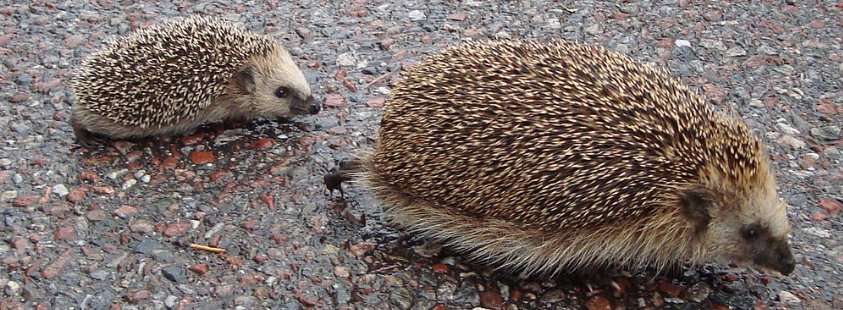There are 43 species of hedgehog worldwide. The Western European Hedgehog (Erinaceus europaeus) lives across Britain and much of Europe. Its closest native relatives are moles and shrews. Hedgehogs are easily recognisable and officially Britain’s favourite mammal!
Diet
Hedgehogs eat mainly invertebrates, and their diet varies with the seasons. Adult beetles, earwigs, earthworms and caterpillars form much of the diet. Slugs and snails are eaten mainly from September when other food is scarce.
Which foods can I put out for hedgehogs?
Habitat
Hedgehogs are present in most parts of Britain, apart from very wet areas, mountains and pine forests. Woodland edges, hedgerows and pasture are favoured habitats, with gardens and urban areas becoming increasingly important. Hedgehogs can roam up to 2km per night, and have territories averaging 10-20 hectares.
With the reduction in natural habitat, hedgehogs need gardens and they need them to be well connected with hedgehog highways so they can travel around at night seeking food and a mate. Find out how to make your garden hedgehog friendly with a hedgehog access hole.
Breeding
Hedgehogs can be breed from their second year, having litters of up to 6 or 7 young. They seek out nesting sites in April, so it’s a good idea to have a log pile or hedgehog house prepared early in the year. Hedgehogs mate usually in May, and the ‘rut’ can be very noisy! Hoglets are usually born in June after four weeks of pregnancy. About a month after their birth, the hoglets will start to leave the nest and join their mother on foraging trips. When the young disperse they become solitary. Litters born later in the year are less likely to gain the weight required to survive hibernation.
Hibernation
Hedgehogs’ food supply disappears in late autumn and so they need to hibernate, usually from October/November to March/April, saving energy by dropping their body temperature and going into a state of torpor. They need to build up sufficient fat stores over the summer in order to survive hibernation. If you have hedgehogs in your garden, its good to put out extra food in late summer and early autumn to help hedgehogs gain enough weight for hibernation. By adding a hedgehog house to your garden you could provide a safe place for hibernation.
Click: Which foods should I put out for hedgehogs?
Sick, injured or underweight hedgehogs
If you find a small hedgehog in the autumn, it may need to be kept in captivity to survive the winter. If you are concerned about the weight or health of any hedgehog, please contact British Hedgehog Preservation Society (BHPS) on 01584 890 801. There is also advice at HedgehogStreet.org. Hedgehogs out in the daytime often need assistance, although breeding females may forage in daylight. You can contact Lindsey on 07807 220995 for local assistance and advice but please note this is not a hedgehog rescue service.




